|
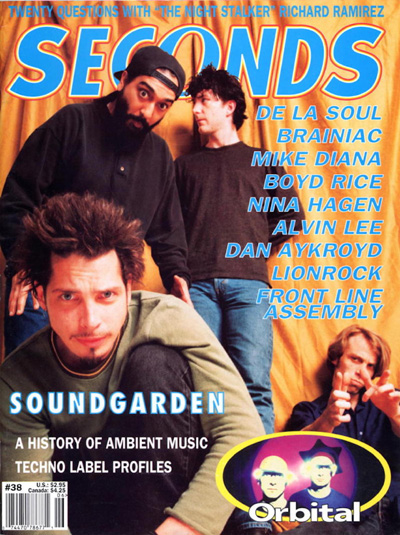
SECONDS
Magazine, No. 38 - September 1996
His music ought to be playing in
the lobby of the Rock & Roll Hall Of Fame. He is
Alvin Lee, formerly of Ten Years After, later of Ten
Years Later, presently Alvin Lee again, someday to
be enshrined.
Ten Years After came as close to
being “underground” as a band could get in the late
Sixties.
They were raw and scruffily
flower-powered. Despite their down-the-road sound,
they aspired to virtuosity and speedy delivery. It
was a time when albums were becoming more important
than specific songs (thanks to the FM radio
revolution) and there was zero nostalgia in music
marketing, the Blues being something new to the
White market. Ten Years After, who cranked out
unfolding jams for hours on end and mixed genres
with ease, were perfect for the emerging expansion
of styles and attention spans. They enjoyed
substantial recognition due to the sophistication
and curiosity of the day’s audience. Lee’s unique
guitar frenzies demanded that often – very often –
he was mentioned along with contemporaries Eric
Clapton, Jeff Beck and Jimmy Page (after all, he was
one of the fastest and most fluid guitarist in the
business).
You’ve heard Lee do his thing as
Ten Years After’s big hit “I’d Love To Change The
World” echoes Muzak – like over the drone of our
planet, where no clatter can drown out his soaring
post-Psychedelic guitar riffs that served as
prototypes for many later mainstream Metal
styling’s. And you’ve heard Ten Years After_s
Woodstock workout of “I’m Going Home”, in which
Alvin Lee lays down some of the fastest Blues in
history. But, what else do you know?
Long Before Ten Years After’s
Woodstock Showcase, Alvin was a teenage Blues Wizard
in early Sixties England, even playing with John Lee
Hooker in London. Alvin paired up with bassist Leo
Lyons for gigging in an array of groups such as The
Jaybirds and Britain’s Largest Sounding Trio.
Drummer Ric Lee joined Alvin and Leo in 1965, after
which they persued a sound with an emphasis on Hard
Blues. Two years later, with keyboardist Chick
Churchill in tow, the assemblage had released a
self-titled album as Ten Years After on Deram
Records.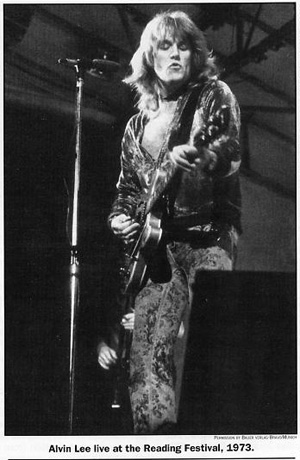
Subsequent recordings like Undead
and Stonedhenge were not huge sellers but were
highly regarded discs that established Ten Years
After in the burgeoning Rock underground.
In the year prior to Woodstock,
they wowed audiences at the Fillmore West and New
York’s (Steve Paul) Scene Club with a Hyper-Blues,
that was equally kaleidoscopic and pyrotechnic.
Growing out of the underground,
post-Woodstock Ten Years After became a marketable
commodity and jumped from Deram Records to Columbia.
After 1971’s “A Space In Time” and 1972’s “Rock and
Roll Music To The World”, Alvin and crew had moved
up to headlining status in America’s biggest
venues.
But Alvin was reluctant to assume
“Rock Star Stature”. He instead
built a studio in his home and with White Gospel
Singer
Mylon LeFevre recorded an album
entitled “On The Road To Freedom” (1973 – on which
superstars such as Steve Winwood, George Harrison
and Ron Wood guest-stared on).
By 1974, Alvin Lee had obviously
enjoyed his time away from the Rock & Roll ruckus of
Ten Years After – so much that he put together a
nine piece band around Mel Collins and Ian Wallace (both of King
Crimson). They recorded a Live Album
of non Ten Years After material, and called
themselves, “Alvin Lee and Company” and the album
“In Flight”.
However, while Alvin’s solo
adventures were taking place, managers, lawyers,
booking agents, girlfriends, and of course his
band-mates were consumed by thoughts of all the
money that could be made by getting Alvin back into
the lucrative American coliseum circuit, blazing
through “Going Home” just one more time. So Ten
Years After re-grouped and recorded one final record
album called “Positive Vibrations”. After a
“farewell tour” at the beginning of 1975, Alvin
started anew; the next six years saw The Alvin Lee
Band release albums such as: Pump Iron, Free Fall
and Rocket Fuel.
The Seventies turned into the
Eighties and you know that story; Punk Rock, New
Wave, Electro Pop, Rap and all the rest – but Alvin
continued to boogie right through it all.
During that period, playing in
Alvin Lee’s group was one of the best gigs an
old-school rocker could have. Down on their luck
musicians like ex- Rolling Stones guitarist Mick
Taylor and ex-Stephen Stills Manassas bassist Fuzzy
Samuels found gainful employment with Alvin.
After 1981’s RX5 album, Alvin was
not ready to make the move into hi-tech AOR pabulum
like so many of his English contemporaries – so he
did nothing and passed his time at home.
If he had the urge for a jam
session, he could always ring up old chums like
George Harrison, who guessed on the sturdy Detroit
Diesel album released in 1986.
1989 marked the return of the
original Ten Years After line-up under the sardonic
name
Ten Years Later for a reunion
album on Chrysalis. (note from Dave – Ten Years
Later was the name of Alvin’s solo band and had
nothing to do with Ten Years After).
About Time was the name of the
new album and subsequent Ten Years After tour. It
was a pleasant affair for those involved, but there
was an apparent oldie-but-goodie “Remember Us?, look
to it all. Not looking to go the eight shows at the
amusement park route, Alvin detached himself from
the Rock Conglomerates and joined up with the New
York based label
Viceroy. Nineties recordings on
Viceroy like “I Hear You Rockin” and “Zoom” rate
among his strongest works.
Today you’ll find Alvin touring
the world not on the Rock Revival Circuit, but
rather in small and sweaty Blues Clubs. Presently
accompanied by fellow travellers Eric Burdon and
Anysley Dunbar, Alvin plays good-time Rockabilly to
an older but reverent and musically educated
audience who are there, Not For Goin´Home – but to
see Alvin Lee and his guitar roam the plains of the
great American Blues.
The Interview With Alvin Lee:
Seconds: What aspect of your work do
you recognize in music today?
Alvin: Licks and tricks,
really. There’s certain licks I play that I know
I’ve developed that not many other people play. I
never used to copy players. I was a big fan of Chuck
Berry, but I never copied his solos. I’d emulate his
style. Sometimes I hear my actual licks copied. I
realize there are some young guys out there
listening to me, like I listened to Chuck Berry.
That’s an on-going thing.
Seconds: You are particularly noted
for playing fast.
Alvin: The original
“Captain Speed-Fingers” yeah. That was something
that just happened, actually. I never tried to play
fast. If anything, I tried to slow it down a bit.
With the adrenaline of live gigs, it just used to
come out that way. I never acknowledged that
“Fastest Guitarist In The West”
and all that because it just isn’t true. Django
Reinhart was before us all and played much faster
than anybody I’ve ever heard. A lot of Jazz players
like
Barney Kessel and John McLaughlin
play much faster than me. I’ll play light and
shade,
I’ll play things slowly and then hit you with some
rocket riffs. It’s nothing I set out to do – it’s
quite the opposite; I always tried to hold it back a
bit.
Seconds: What other
qualities of your guitar playing would you like to
be remembered for?
Alvin: I just play by feel,” from the hip”, as they say these
days. I’m
not musically trained.
I’ve been asked to do one of
these “Hot Licks” type tutor-videos and I’m not sure
if I’m the right man for the job, because I never
really know what I’m playing. I’ve developed a style
where my fingers will do what my brain says, but I
don’t get in the middle of that. It’s one of those
things where I grit my teeth, dig in, and just play
it. It’s an automatic thing. It doesn’t work
slow; I
forget where I’m going. I don’t play scales or
anything like that – in my mind, scales are a waste
of time. You learn to play a major scale but you
can’t use it !
It doesn’t sound nice. What’s the
point of learning to play something that doesn’t
sound nice?
So I make my own scales up. I
make scales that I want to hear. It sounds better
and I can use it. I don’t think about my playing too
much. I don’t sit down and practice this lick or
that lick, I just play.

Seconds: What’s the
center of gravity, the thing you come back to the
most?
Alvin: The center of
gravity is the guitar and me.
Seconds: I hear the
word Rockabilly in connection with you….
Alvin: Yeah, I was a big
fan of Scotty Moore. I met Scotty in Nashville. I
had to say to him,
“That second solo in “Hound Dog”
– how did you play that?” He said, “I just grabbed
a handful. I’ll tell you about another time I fucked
up….” It was a mistake. That’s what I like about
Blues and Rock N´ Roll – sometimes the mistakes are
the great bits. You make a mistake and it sounds
good. That often happens when I’m playing live. I
told Scotty a lot of us guitarist were trying to
work out how he played this second solo to “Hound
Dog,” and it’s a complete mystery, even to him.

Seconds: You don’t like your
music to be too polished.
Alvin: I’m kind of an amateur
engineer. I’ve got my own twenty – four track studio
and I’ve always fooled around and made demos. Over
the last ten years, I’ve got more and more involved
with drum computers and synthesizers and sequences.
It’s a lot of fun, but it led me astray a little
bit. On the “Zoom” album, there’s a song called
“Jenny Jenny”. It pleased me because it sounds like
a Rock & Roll tune, but it was actually cut with a
drum computer. On “I hear You Rockin;” I listened to
some old Ten Years After songs and said, “How did we
record then? How did the songs come about?” I
remember sitting with the band in one room and
playing tunes, so that’s what I did on this last
album. It’s simple, but I clouded by technology.
When I first started touring after I made the album,
I did something I’ve always wanted to do. I went
onstage and said, “I’ve just made a new album and
now I’d like to play it for you”. I played the whole
album from start to finish and it was great. Now,
I’m playing a mixture of old favourites because I
think the audience would like to hear the classic
cuts, as well as the new stuff.
Seconds: What do you regard as
your classic stuff?
Alvin: “I’m Going Home” – “Love
Like A Man” – “Good Morning Little Schoolgirl” –
“Slow Blues In C” – I’ve just started doing “I Hear
You Calling” again.
Seconds: How was Ten Years After
different from other Blues Rock bands of that time?
Alvin: Ten Years After was never
a very happy band. It was a constant war, which made
the style what it was. I was playing rocket riffs,
the bass player (Leo Lyons) was playing rocket riffs, the
drummer, (Ric Lee) was playing a constant
drum solo, and a lot of the time it was very
frustrating. I wanted to hear a bit of backbeat, but
the band was so busy – every-time I’d take a solo,
everyone else would take a solo at the same time.

Seconds: But you had the final
word, right?
Alvin: Yeah, to a point. I never
told a musician what to play. It’s far too
corporate. If you want a happy musician, if you want
a contribution from the guy, he’s got to be playing
what he likes.
Seconds: Yet you were together a
long time….
Alvin: It was enjoyable, but I
started to move toward solo projects because I
wanted to move on and I to try other things. The
first solo album I did was. “On The Road To Freedom”
(1973) – which was a little statement in itself, and
it was basically Country Music. It was a whole
different feeling. I had Ian Wallace playing simple
drums and Boz Burrell from (King Crimson and Bad
Company), who was one of my favourite bass players.
After playing with Ten Years After, where everything
was a racket and solos, suddenly I was playing with
Wallace and Burrell. I’d start a Rock n´ Roll
song,
and instead of them coming crashing like I was used
to, they’d come in with a neat half-time feel. To
me, that was great. I’ve always liked to do
different things; I don’t like to get stuck in a rut
too much. I’ve always experimented with music. I
hate the kind of person who sits down and says,
“What’s popular?
What the people want to hear,
I’ll play that”. That’s too contrived. I always like
the music I play. I’ve gone astray a few times, I
must admit. Record companies say they want you to
record something that’s popular so it can get played
on the radio – I tried it a few times and it never
works. The radio stations say, “This isn’t Alvin
Lee’s stuff. We want the real Alvin Lee. “I’ll stick
to my guns and play what I like and it’s more
rewarding. If you do have some success and it’s come
from your heart, it’s much more rewarding.
Seconds: Ten Years After albums
were very referential to Psychedelia, but they were
also Blues albums.
Alvin: That was all part of that
Sixties feel. On the second album, Ten Years After
did, the live album called “Undead” we just played
in a club and recorded it. I heard it back a couple
of days later and thought, “This is great”. This is
the band playing the best they’ve played. Where do
we go from here?”
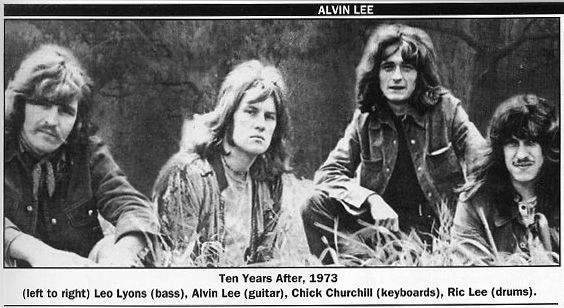
I was quite worried, I thought I’d
peaked. I didn’t know what else to do. The way my
mind went then was, “I’ve done that, so let’s
experiment in other regions”. I suppose the
Psychedelic era was on us and I was playing around
with mind expansion as much as anyone else, and I
guess it just came out in the music. I was always
trying to not get tied down by any particular bag.
Seconds: Was the drug scene an
integral part of the music?
Alvin: Not integral, but
inspirational in a way.
Seconds: Did that all
change?
Alvin: It has now for me – but
not that recently! I’ve been a heavy user for a long
time. I only cleaned up my act quite recently.
Seconds:
An intoxication ritual
is a great motivator for music.
Alvin: It is and it isn’t.
Inspiration is hard to get, and anywhere you can get
it, you get it. I’ve never been into heavy drugs at
all. I was a pot smoker, I took LSD, and I found LSD
to be quite inspirational.
Seconds: Did you do it when
playing live?
Alvin: I have, in the bad old
days. Once at the Fillmore West, as I walked on
stage, the chemicals took over. I hit a test note on
my guitar and I heard it hit the back of the wall
and hit everybody’s head on the way back and bounce
up. Most of what I remember about this gig is what
people told me afterwards. I know I played “Slow
Blues In C” and then said “Now I’d like to do Slow
Blues In C and played it again. All the fans were
giving me very strange looks. There was one point
where I was playing this solo, finished the solo and
thought, “What song is this?” I came back playing
another song. I got away with it, nobody wanted
their money back. Things like that tended to happen
at the Fillmore West.
Seconds: Did drugs take a toll on
your contemporaries?
Alvin: When people started to
die, that was not funny. I’ve always been very
against heavy drugs. I’ve never been in the same
room as Heroin. If anybody ever started to strap
their arm up, I’d make it known that I disapprove
and walk out. I’ve seen too many go that way. But
smoking pot is harmless. Acid’s probably a bit
risky, but you can’t be too safe in this world, can
you? I was quite a late starter in drugs. I never
wanted to be reliant on anything. I liked the way I
was going and didn’t want to change anything. The
first time somebody gave me some Speed Pills, I was
so worried that I made myself sick and spewed them
out.
Seconds: Do you consider Cocaine
one of the heavy drugs?
Alvin: I don’t consider it
heavy,
I consider it a waste of time and money.
Seconds: Did you see its effect
on people around you?
Alvin: Yeah, I was a late starter
on that too. I used to say, “How stupid putting
white powder up your nose”. Eventually, I started
doing it myself, as well. That led to three day jam
sessions, out of which nothing came except a lot of
rubbish. There was a time where I thought, “I don’t
see the way out of this,” and suddenly I got fed up
with the stupid lifestyle and just stopped. I’m
healthy, happy, and I’ve got something in the bank
now, which I never did when I was into that stuff.
Seconds: Your sound became more
complex with albums like “Watt” and “Cricklewood
Green”.
Alvin: I think an important part
of music is evolving, and the band evolved, not
necessarily for the good, but I think it’s best that
a band does evolve, rather than stand still. We
could have played that same style and become a
cardboard cut-out band and made enough money to live
fine, but I wanted more than that. I wanted personal
creative rewards; I wanted to feel I was doing
something more important than making a living.
Seconds: And the offer to play
Woodstock……
Alvin: That just came about in
the middle of a tour. I didn’t recognize it as
anything different until I got there.
Seconds: It was a real
demarcation point in your career.
|
Alvin: In retrospect, yes, but it
was the movie that did that. The band was playing
the Fillmore West, Fillmore East, Kinetic Playground, Boston Tea Party…..the
underground. We’d
play to 1,000 to 2,000 people at the most. They’d be
right up front, sweat dripping down the walls. Some
of the best gigs I’ve ever done were those kind of
gigs.
We played the Woodstock Festival
– great experience – but for a year we carried on
playing club gigs. It wasn’t till the movie came out
– that silver screen, larger than life feeling, and
suddenly I found we were playing basketball stadiums
and ice hockey arenas. You’d think playing to 20,000
people in arenas is making it, but it was horrible,
I hated it. Having played clubs all my life, I
suddenly found myself in ice hockey arenas where
you’d finish the number and the sound continued on
for another thirty seconds – huge barriers, so you
couldn’t see the audience – and in those days, they
didn’t have security guys; they had real cops with
guns and cotton wool in their ears. I was playing to
the back of coppers heads and thinking, “What am I
doing this for?” People were shouting for “Going
Home” through every number, and I got very
disenchanted with that.
|
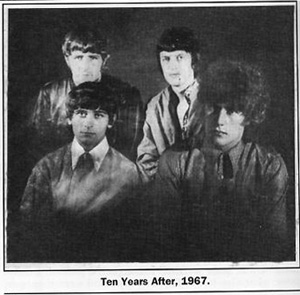
|
Seconds:
If you didn’t enjoy
playing the arenas, who was making you do it?
Management and Record Companies?
Alvin: Pretty much. I wanted to
do it at first. You think that’s what you want; you
have to actually get it to find out it isn’t what
you want. I used to walk onstage with everybody
screaming and shouting – it didn’t seem like I had
to do anything. With everything I did, they weren’t
really listening to it. Nobody was picking on it.
I’d play a rotten show, everybody would come back
afterwards and say it was great. I’d play a good
show, and everybody would say it was great. I don’t
think anybody really knew. Generally I wasn’t
getting any feedback. It’s a very unreal situation.
My hero’s are Blues Musicians and I was becoming a
Pop Star, which I didn’t want. A lot of people will
say Woodstock made Ten Years After, but in fact it
was the beginning of the end. At that point,
disenchantment went on. To me, it was a big trap.
I was constantly plagued by media
obligations; it was ridiculous. I was doing twenty
interviews a day and by the time it came time for
the gig, I didn’t know where I was. I actually made
the decision to de-escalate that thing. I stopped
it. The managers, the record companies the agents,
they all said, “Alvin, you can make millions of
dollars”. I said, “What’s the point of having
millions of dollars if I’m crazy?” I didn’t want
what was happening to me.
I stepped out of it and there’s
no regrets. I’m playing a club tonight and that’s
what I love doing. I’m glad I’m not playing Madison
Square Garden tonight.

Seconds:
Tell us about “A Space
In Time”.
Alvin: A Space In Time was me
making a break. After the Woodstock Movie, I had no
time to write songs. I was writing songs in the taxi
on the way to the studio. The band would say,
“What do you got” and I’d make a
song up right there. It worked; it was natural. I
still write songs like that nowadays, but at the
time I thought it ought to be harder than that. I
wanted to struggle, I wanted to sit up all night
writing. So I said, “I want six months off to write
songs”.
That was the first time I heard,
“But Alvin, you could make a million dollars in the
next six months”. Nobody could understand I didn’t
want that.
Seconds: How was the band
politics concerning money?
Alvin: Everybody was a bit burned
out with these auditoriums, to be honest. I wasn’t
the only one. The other guys quite liked making lots
of money, whereas I thought it was distasteful, I
didn’t think I deserved it. With A Space In Time, I
said I was taking six months off. I wanted to be
proud of the music I made. “I’d Love To Change The
World” was one of the songs on that album I was
really happy with.
Seconds: On The Road To Freedom
with Mylon LeFevre was a real departure from the
Ten Years After sound.
Alvin: I was trying to get back
to some sanity and get away from Rock & Roll. When I
did that, I realized that wasn’t what I wanted
either and I came back to Rock & Roll. I went to see
Jerry Lee Lewis and he was playing Country &
Western. He didn’t play “Whole Lotta Shakin” or
“Great Balls Of Fire” and I was really
disappointed.
I came out of that gig and I thought, “If people
come to see me and I didn’t play “I’m Going
Home,”
they’re going to come out of the gig feeling like I
feel”. It’s ok being an artist and playing what you
want, but if people are paying money to come and see
you, then you’ve got to give them something of what
they want. That night, I went back to my band with
Ian Wallace and Boz Burrell and said, “We’re doing
I’m Going Home tonight”. I finally came full circle
and came back to
Rock & Roll and found it’s what I
did best.
Seconds: It seems you’ve managed
both your fame and your money pretty well.
Alvin: Yeah, by the skin of my
teeth.
Seconds:
You’ve probably had
former millionaires looking to borrow ten bucks from
you.
Alvin: It happens, sure. If you
want security, there’s no security in the world. If
you’ve got a million pounds, somebody can steal it
from you. The only security I’ve ever found as a
musician is that I can sing for my supper. I can do
a gig and make money to live.
Seconds: Did you have
contemporaries that lost their resources and looked
to you with resentment?
Alvin: Most of those guys didn’t
care. They were so out on a limb, they didn’t
realize what they had and when they lost it, they
didn’t realize it either. You make the best of what
you’ve got, don’t you? It’s not so much the guys
that made millions and lost millions , it’s the guys
that made millions and never got it. There’s lots of
that, guys that had hit records and never saw a
penny because of their crooked manager. I was lucky,
I had a manager who used to say he was ninety
percent straight, so I figured I got ninety percent
of the money coming to me.
Seconds:
How about your
subsequent band, Ten Years Later?
Alvin: The name in itself was an
anniversary, it was ten years after, Ten Years
After. There was a time around 1973 when I didn’t
have any interest in the band anymore and the
manager said, “You could have any musicians you
want, Just call it Ten Years After. Keep the trade
name”. To me that was very distasteful. I wanted to
leave that and start again.
Seconds: I get the idea that you
just considered yourself a guitar player in a group
called Ten Years After, and were bothered by the
fact that people fixated on you.
Alvin: It was never intended to
be that way. It was a communal group, but obviously
the singer and lead guitarist will be in the
spotlight ninety percent of the time. I was getting
bad vibes from the rest of the band. They were a bit
miffed, that I was becoming the front man.
That really started the rift
within the band; they wanted to do interviews, too.
So the manager would say, “Chick Churchill’s going
to do the interview instead of Alvin Lee,” and the
people would say, “We don’t want him, we want
Alvin,” and the resentment built.
Seconds:
In your current music,
what do you look for?
Alvin: The feel. If it feels
right, it’s good.
Seconds:
If you experience a huge
resurgence of popularity and someone calls you up
saying,
“Alvin, we want you to play
Madison Square Garden,” what will you say?
Alvin: I’d probably do it. I’ve
learned a lot of lessons. Now I’ve got control, I
know what I’m doing. In those days, I didn’t know
what I was doing. I was pretty lost and the drug
haze didn’t help. When you get to my age, you learn
to make things easier for yourself. When you’re
twenty three, you seem to be intent on making things
hard for yourself – “How many drugs can I take and
still play?” I’d give playing Madison Square Garden
a whirl, I’d try and put over my music the way I
want it to be. But I don’t think there’s too much
danger of that happening.
|
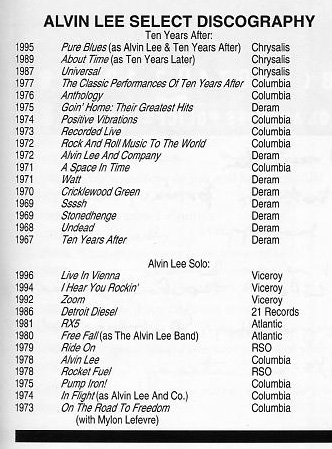
|
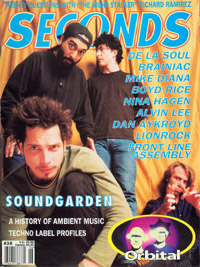
#38 (September 1996)
|
|